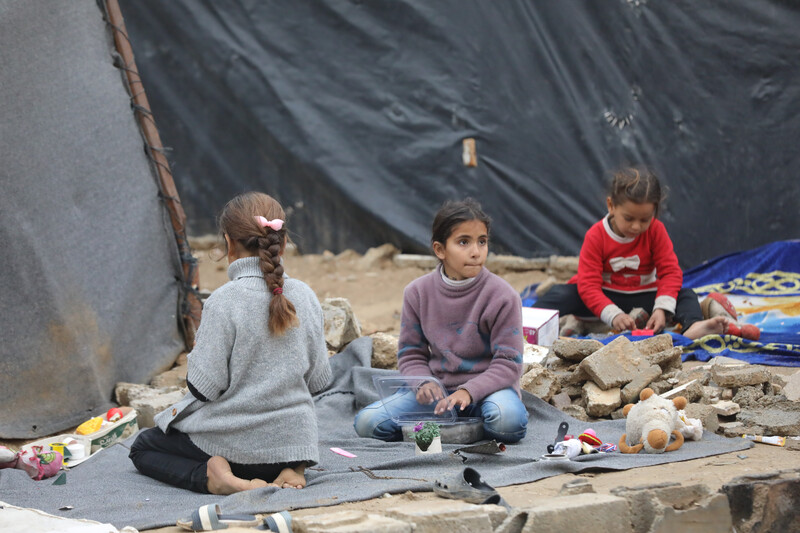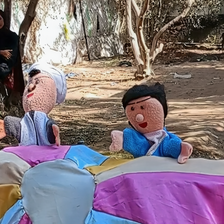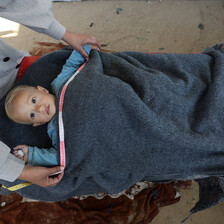The Electronic Intifada 19 February 2025

Displaced children play in the rubble near their former homes in al-Bureij camp in the central Gaza Strip on 10 February 2025.
APA imagesKawthar Shomar, 35, wakes up every morning to stand in a long line west of the city of Deir al-Balah to get food for her children.
As soon as she finishes feeding them, she prepares to go to a stall in the city market. There she will spend the day sewing worn-out shoes to earn money to provide her family with basic needs, including for blankets to protect against a winter that has already claimed several lives.
Shomar was widowed after an airstrike killed her husband in December 2023 in an attack on the popular Shujaiya market in Gaza City.
“After my husband was martyred, I went with my four children to the southern Gaza Strip to escape the bombing. I did not know where I would go,” Shomar told The Electronic Intifada in December.
She and her children were displaced more than six times, during Israel’s genocidal attack, ending up in a tent inside a shelter for displaced people west of Deir al-Balah.
“I didn’t have any money to buy clothes and food for my children. In the end, I decided to sell my wedding ring,” she said.
Shomar first found work making pastries and selling them from a small stall, and now she sews worn-out shoes.
“I feel like I have to be a superwoman, and I am dealing with many difficult responsibilities towards my family. All I want is for my children to feel safe again and for me to regain some of the life that the war stole.”
A population of widows
Shomar is far from alone. Israel’s indiscriminate attacks have created a population of widows that need not only provide their children with food, clothing and shelter, but also have to learn alone how to deal with repeated displacements from areas targeted.
In the Beach refugee camp, west of Gaza City, Hasina Younis said she struggled on the last day of December to fill a plastic gallon with drinking water for her five children amid a crowd of people waiting to do the same.
Younis, 41, became a widow after an Israeli airstrike killed her husband in March 2024.
“After I get drinking water, I start kneading flour and baking it in the clay oven I bought to feed my five children,” Younis told The Electronic Intifada by phone.
She did not, however, obey the Israeli military’s orders to move from the north and insisted instead to stay in her city.
It was harsh. The Israeli offensive on the north – which lasted from early October until a ceasefire came into force on 19 January – saw those left in the north suffer famine and relentless bombardment. Many died. Those who left, returned to a wasteland.
Younis used to work as a teacher in a private school that was destroyed in the Israeli attacks. Unable to teach, she has instead found work over the past 16 months embroidering clothes and making perfumes in a small stall that her brother built in a market west of the city.
Younis feels that widows have been abandoned.
“No one cares about us,” she said.
After Younis finishes work, she uses her teaching experience to instruct her children in English, mathematics and science in their small tent that is now home.
War on women
“The ongoing Israeli war on the Gaza Strip is a war on women,” Ismail al-Thawabtah of the government media office in Gaza, told The Electronic Intifada on 1 January.
He said women and children bore the brunt of the aggression, making up some 70 percent of the total casualties. According to the UN, at least 17,000 children lost their fathers or both parents during Israel’s 15-month genocidal aggression.
In response, volunteers established Al-Barakah camp for displaced widows and their children last April in the al-Mawasi area of Khan Yunis to provide widows and orhpans with a safe environment.
The camp’s director, Mahmoud Kalakh, said the camp came into existence because of appeals from widows to provide them with their own shelter due a lack of available tents and severe overcrowding in other shelters.
The camp currently houses about 70 widows and their children.
According to Kalakh, the camp provides daily meals, drinking water and limited electricity to charge phones and lighting.
Abla Mansour, 36, whose husband was killed in an Israeli attack last April, lives in the camp with her three children, 4, 10 and 12.
“Sometimes I have to sleep hungry to leave food for my children,” she said in early January.
She said her children try to help their mother in any way they can by collecting wood to light fires, standing in long lines to get drinking water for the family or doing various other errands.
As night fell, Mansour used the dim light of a candle to sew old clothes that she will try to sell at a nearby market. She said the money she would make would barely provide for her children’s basic needs.
However, she refuses to give up.
“Hope is the only thing we have left,” she said.
Rasha Abou Jalal is a journalist in Gaza.




